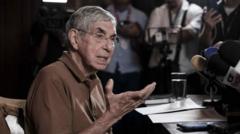Oscar Arias, the former president of Costa Rica and Nobel Peace Prize winner, has publicly stated that his U.S. visa has been revoked weeks after he criticized former President Donald Trump, likening his actions to those of a "Roman emperor." The 84-year-old was informed of the cancellation through a brief email from U.S. authorities, which did not provide any specific reasons for the decision.
During a news conference in San José, Arias expressed confusion over the revocation, hinting that it may be linked to his diplomatic relations with China during his presidency from 2006 to 2010. He underscored that he cut ties with Taiwan to establish relations with China, which he believes is well-documented. Arias suspects that the decision to revoke his visa could stem from the U.S. State Department, rather than President Trump directly.
The Trump administration has been wary of China's growing influence in Latin America, often criticizing Central American nations for their increasing ties with Beijing, even as it has shown support for the current president of Costa Rica, Rodrigo Chaves. Chaves has taken steps to distance his government from China, particularly in technology sectors such as 5G development.
Arias' criticism of Chaves' policies further complicates the situation, as he called out the U.S. government's pressure on smaller nations to conform. He lamented the challenges smaller countries face in opposing U.S. directives, sharing that during his tenure, Costa Rica maintained its independence from American influence.
Notably, Arias is not alone; three members of Costa Rica's national assembly who opposed Chaves' exclusion of Chinese companies from tech contracts have also seen their U.S. visas revoked. The implications of these visa cancellations suggest a problematic trend in the intersection of diplomacy and political critiques within Central America.
During a news conference in San José, Arias expressed confusion over the revocation, hinting that it may be linked to his diplomatic relations with China during his presidency from 2006 to 2010. He underscored that he cut ties with Taiwan to establish relations with China, which he believes is well-documented. Arias suspects that the decision to revoke his visa could stem from the U.S. State Department, rather than President Trump directly.
The Trump administration has been wary of China's growing influence in Latin America, often criticizing Central American nations for their increasing ties with Beijing, even as it has shown support for the current president of Costa Rica, Rodrigo Chaves. Chaves has taken steps to distance his government from China, particularly in technology sectors such as 5G development.
Arias' criticism of Chaves' policies further complicates the situation, as he called out the U.S. government's pressure on smaller nations to conform. He lamented the challenges smaller countries face in opposing U.S. directives, sharing that during his tenure, Costa Rica maintained its independence from American influence.
Notably, Arias is not alone; three members of Costa Rica's national assembly who opposed Chaves' exclusion of Chinese companies from tech contracts have also seen their U.S. visas revoked. The implications of these visa cancellations suggest a problematic trend in the intersection of diplomacy and political critiques within Central America.





















